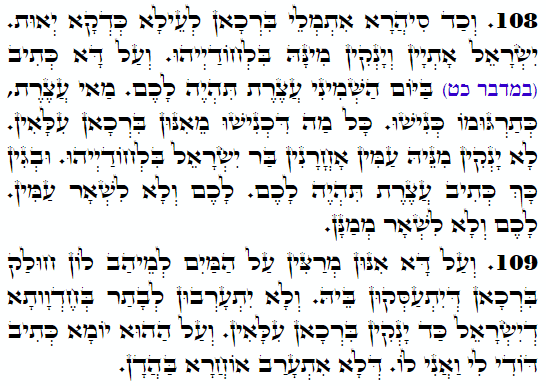Daily Zohar # 3758 – Noach – Joyously draw water From the springs of salvation
Hebrew translation:
108. וּכְשֶׁהַלְּבָנָה מִתְמַלֵּאת בְּרָכוֹת לְמַעְלָה כָּרָאוּי. יִשְׂרָאֵל בָּאִים וְיוֹנְקִים מִמֶּנָּה לְבַדָּם. וְעַל זֶה כָּתוּב (במדבר כט) בַּיּוֹם הַשְּׁמִינִי עֲצֶרֶת תִּהְיֶה לָכֶם. מַה זֶּה עֲצֶרֶת? כְּתַרְגּוּמוֹ כְּנִישׁוּ (הִתְכַּנְּסוּת). כָּל מַה שֶּׁכִּנְּסוּ מֵאוֹתָם בְּרָכוֹת עֶלְיוֹנוֹת, לֹא יוֹנְקִים מִמֶּנָּה עַמִּים אֲחֵרִים, פְּרָט לְיִשְׂרָאֵל לְבַדָּם. וְלָכֵן כָּתוּב עֲצֶרֶת תִּהְיֶה לָכֶם, לָכֶם וְלֹא לִשְׁאָר הָעַמִּים, לָכֶם וְלֹא לִשְׁאָר הַמְמֻנִּים.
109. וְעַל זֶה הֵם מְרַצִּים עַל הַמַּיִם, לָתֵת לָהֶם חֵלֶק בְּרָכוֹת שֶׁיִּתְעַסְּקוּ בוֹ, וְלֹא יִתְעָרְבוּ אַחַר כָּךְ בְּחֶדְוַת יִשְׂרָאֵל כְּשֶׁיּוֹנְקִים בְּרָכוֹת עֶלְיוֹנוֹת. וְעַל אוֹתוֹ יוֹם כָּתוּב דּוֹדִי לִי וַאֲנִי לוֹ. שֶׁלֹּא מִתְעָרֵב אַחֵר עִמָּנוּ.
.
Zohar Noach
Continued from previous DZ
#108
When the moon is filled with blessings from above, Israel alone comes and sucks nourishment from it. For that, it is written,
Numbers 29:35
“בַּיּוֹם הַשְּׁמִינִי עֲצֶרֶת תִּהְיֶה לָכֶם כָּל מְלֶאכֶת עֲבֹדָה לֹא תַעֲשׂוּ.”
“‘On the eighth day, a sacred assembly shall be for you. You shall do no customary work.”
The ‘עצרת’ ‘assembly’ is what they gathered from the supernal blessings. The other nations cannot connect to the same source, only Israel alone, as clearly stated in verse, “a sacred assembly shall be for you,” not other nations or ministers.
#109
During the holiday of Sukkot, Israel, please the Holy One Blessed be He with the water that they pour on the Altar during the bull sacrifices that provide blessings for the ministers of the seventy nations. When these ministers draw their share of blessings, they don’t interfere with the joy of Israel when they receive their own supernal blessings. On that day it is written; Songs 2:16
“דּוֹדִי לִי וַאֲנִי לוֹ הָרֹעֶה בַּשּׁוֹשַׁנִּים.”
“My beloved is mine, and I am his. He feeds his flock among the lilies.”
This verse reveals the special close relationship of Israel with Hashem.
Lesson;
The ceremony of pouring water on the Altar is called ‘ניסוך המים,’ pronounced ‘Nisuch Hamayim.’
During the sacrifices offered during the year, the priests poured wine on the Altar, which has the aspect of Left, Gevurah. During Sukkot, the priests added water to the process to inject Chassadim and connect to the blessings that come during the holiday.
The process of pouring the water, ‘Nisuch Hamayim’:
Every day during the Sukkot holiday, at dawn, the priests and the people would go out to draw water from the Gihon spring using a saucer of gold (about one Liter of water). The pumping of water was done in great festivity and solemnity. It was accompanied by the singing of Levites with musical instruments, as it is written in Isaiah 12:3 “וּשְׁאַבְתֶּם מַיִם בְּשָׂשׂוֹן מִמַּעַיְנֵי הַיְשׁוּעָה.” “Therefore, you will joyously draw water From the springs of salvation.”
After the pumping, they would reach the Water Gate in the temple, where they blew trumpets. The priest who won the task of pouring water would go up to the Altar and turn to the west-south corner, where he would make the pouring. The priest would pour the water from the golden saucer into a silver cup that had holes at the bottom while pouring wine into a similar cup, which was also with holes at the bottom. Two priests poured the liquids of water and wine at the same time. The liquids came out from the holes in the cups onto the Altar and into a cavity deep below the Altar.
{||}

 Previous: Noach
Previous: Noach


